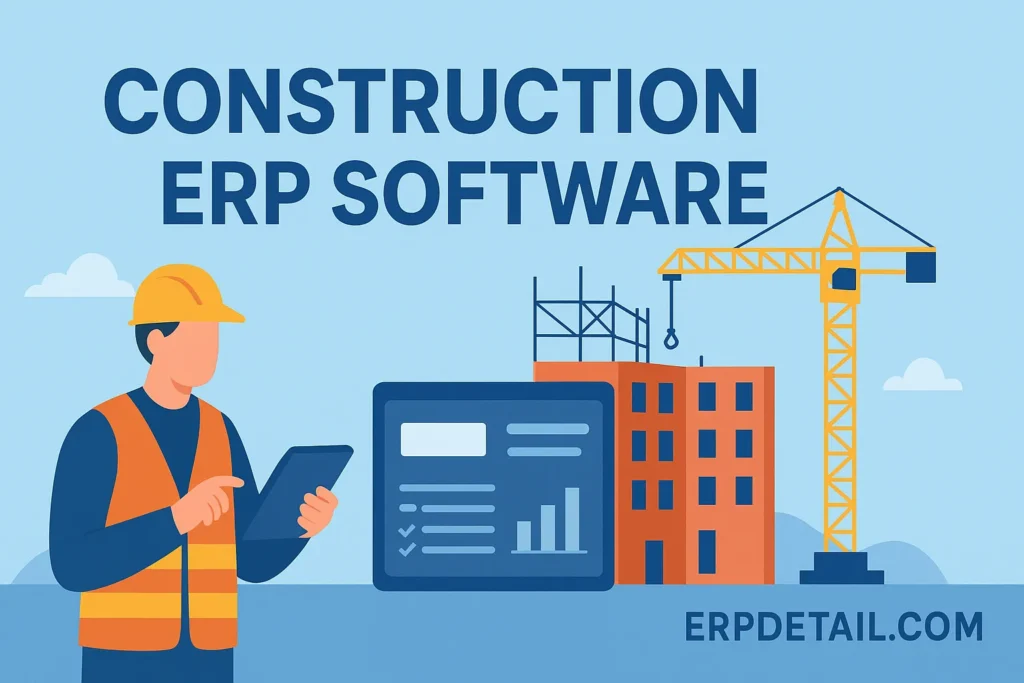
Construction ERP software has become a cornerstone for the modern construction industry. Unlike traditional tools, enterprise resource planning (ERP) systems bring together accounting, project management, and field management on a single platform. From small-business contractors to large businesses handling infrastructure projects, construction ERP solutions help streamline operations, reduce costs, and improve project delivery.
Why Construction Firms Need ERP Solutions
Construction firms often juggle multiple construction projects across different business units. Without a unified system, data integrity issues, compliance requirements, and delays in financial reporting can arise. By using a centralized data management system, construction companies can make data-driven decisions, improve customer satisfaction, and ensure regulatory compliance.
Core Features of Construction ERP Software
Project Management & Operations
ERP platforms support project managers in planning, scheduling, and executing construction operations. Tools for project timelines, project information, and project stakeholders ensure better project delivery. Change orders, project cost control, and job cost accounting are all handled in real-time, reducing errors and labor costs.
Construction Accounting & Financial Tools
Accurate construction accounting remains one of the biggest challenges for construction businesses. ERP simplifies cash flow tracking, payroll processing, and job costing, while ensuring financial accuracy through financial reports. Companies can access historical data, compare previous years, and maintain compliance and risk management standards.
Field & Workforce Management
Modern ERP solutions extend beyond offices to support field service management and workforce management. Mobile app access allows project managers and field staff to share real-time insights, while HR management and payroll processing streamline employee oversight.
Supply Chain & Asset Management
From inventory control to order management, ERP integrates the supply chain and asset management into a unified system. This centralized database ensures construction companies have the right resources at the right time, reducing risk management challenges.
Advanced Technology & Cloud Benefits
Cloud-based ERP and cloud-based construction platforms are transforming the industry. Cloud customers benefit from scalability, mobile access, and real-time visibility across projects. Features such as native AI, real-time analytics, and predictive insights further enhance project management.
Best Construction ERP Software Options
Several software solution providers offer specialized ERP systems for the construction sector. Popular choices include:
- Acumatica’s Construction Edition – flexible for specific needs and future projects.
- CMiC’s ERP – designed for large businesses with complex compliance requirements.
- Foundation Software – known for job cost accounting and financial accuracy.
- Jonas Premier – suitable for construction business units with unique needs.
- Sage 300 – widely used for regulatory compliance and data platform capabilities.
- Microsoft Dynamics 365 – integrates ERP with other business functions.
- SAP S/4HANA – a robust system for specialty trade contractors and infrastructure projects.
These platforms help general contractors and project stakeholders align construction operations with business needs while maintaining a single source of truth.
Improving Efficiency and Cost Savings
ERP technology is not just about managing financial reports; it’s about cost control, cost savings, and better service operations. By offering a single platform with centralized data management, construction companies can streamline operations, improve customer service, and ensure customer success.
Future of Construction ERP
The future lies in software solutions that adapt to the unique needs of construction companies. With data platform capabilities, unified systems, and streamlined service operations, ERP will continue to shape how construction projects are managed. As more companies adopt real-time visibility tools and AI-driven reporting, construction businesses can expect even stronger results in compliance and risk management.
Conclusion
Construction ERP software is more than just a management system — it’s a unified solution for construction companies seeking compliance, efficiency, and customer success. By embracing cloud-based construction platforms and adopting leading solutions like Acumatica’s Construction Edition, CMiC’s ERP, or Microsoft Dynamics 365, firms can align business functions, streamline operations, and prepare for future projects with confidence Construction ERP Software.
FAQ’s
What makes the best construction ERP software?
The best construction ERP software combines financial reporting, project management, and supply chain integration on a single platform. It should also meet specific needs like compliance requirements and payroll processing.
How do ERP systems handle compliance and risk management?
They track regulatory requirements, manage legal issues, and ensure regulatory compliance through real-time insights and data analytics Construction ERP Software.
Can ERP help construction businesses achieve cost savings?
Yes. By streamlining order management, payroll processing, and field management, ERP systems lower labor costs and improve efficiency, resulting in measurable cost savings.
Do ERP systems support specialty trade contractors?
Absolutely. Solutions like Sage 300 and Jonas Premier are designed to meet the unique needs of specialty trade contractors as well as the unique needs of construction companies overall.
How do mobile apps improve ERP for construction?
A mobile app offers real-time visibility for project stakeholders, enabling better communication, faster approvals of change orders, and improved project timelines.
